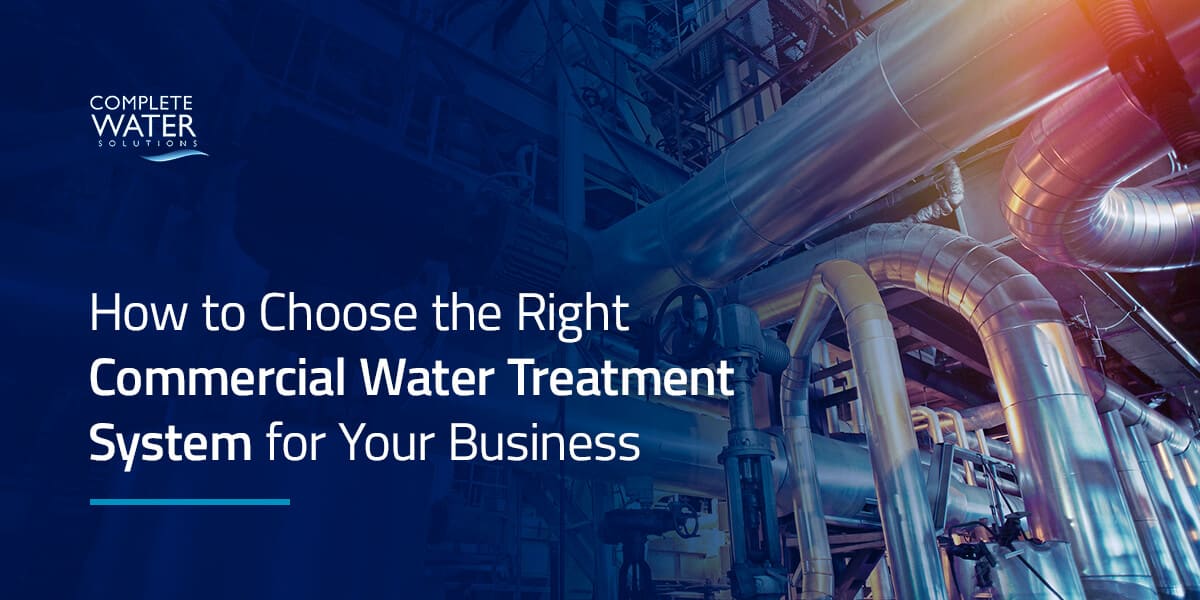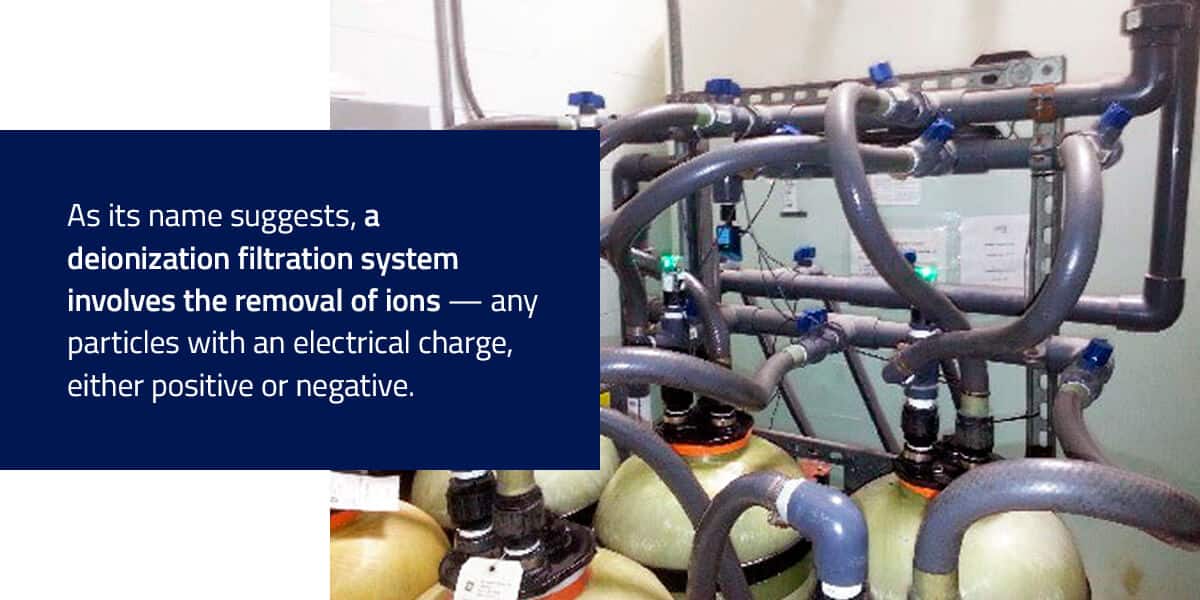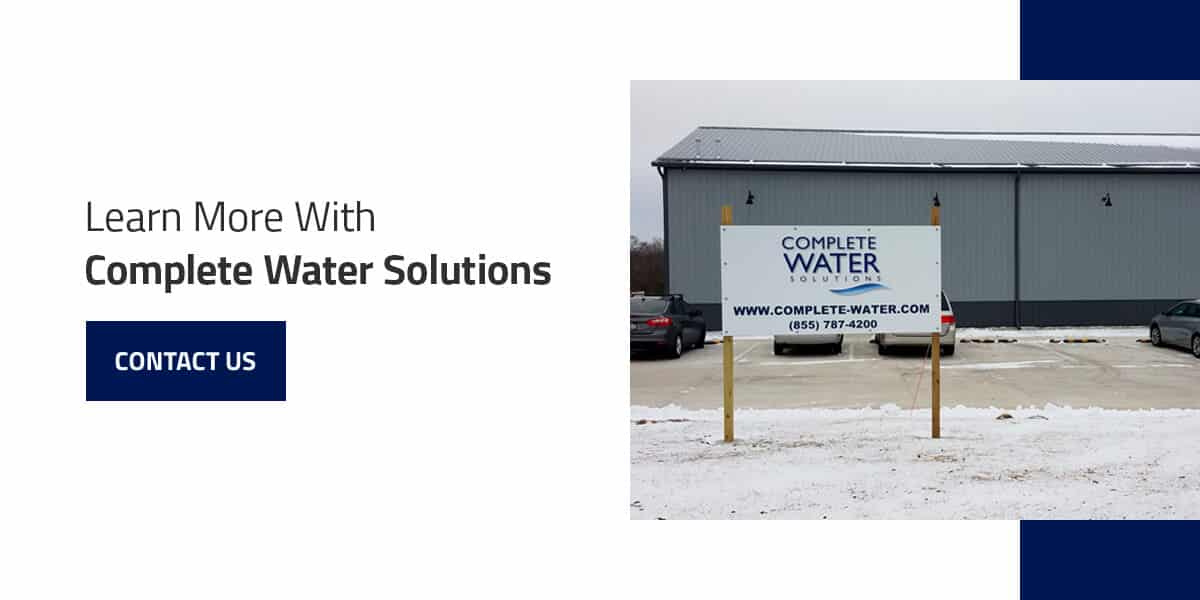Choosing the Right Commercial Water Treatment System for Your Business
Choosing the Right Commercial Water Treatment System for Your Business
 How to Choose the Right Commercial Water Treatment System for Your Business
How to Choose the Right Commercial Water Treatment System for Your Business
Water treatment is necessary for a broad range of commercial industries. Various filters use chemical, electrical or mechanical processes to remove contaminants from a water supply. You’ll need to choose the right kind of filter for your needs, as different filter types target specific particles. Learn more about the types of filters available to determine which is right for you.
Table of Contents
Types of Commercial Water Treatment Systems
Before you can decide on the best water treatment system for your commercial business, you’ll need to know the differences between treatment technologies. Here are some popular filtration systems to consider.
Reverse Osmosis
One type of commercial water purification is reverse osmosis (RO). It uses the natural process of osmosis, in which weaker saline solutions migrate towards stronger saline solutions. Osmosis occurs when plants absorb water from the soil and when the kidneys absorb water from the blood. It’s been happening in nature for millions of years.
With a push, you can reverse the process of osmosis. A semipermeable membrane allows the water through but stops the majority of salts, bacteria and other contaminants. The result is highly purified water. Most RO systems use between three and five membranes to catch as many different contaminants as possible. Higher pump pressure also helps to stop particles.
Uses of Reverse Osmosis
RO is effective for many applications, both industrial and commercial. The purified water it produces is safe for drinking, testing or use as an ingredient. RO is also a common technique for desalination, the process of removing salt from seawater.
Mechanical Filtration
Mechanical or media commercial water filtration uses filters with smaller and smaller pores to catch contaminants. The filters can be regular in shape, such as a mesh screen, or irregular in shape, such as a sponge. Different filters catch different particle types and sizes. Every so often, you’ll need to replace the filters as contaminants build up against them.
Uses of Mechanical Filtration
Many industries require mechanically filtered water. Mechanical filters can remove iron particles, which can corrode pipes. They provide a simple, effective way to remove unwanted particles from your water supply.
Ion Exchange
Ion exchange is a more technical process that’s ideal for removing specific contaminants. It’s often used in combination with other filtration methods, such as reverse osmosis. Ion exchange uses natural chemical reactions to replace unwanted ions with others — for instance, it might exchange calcium for sodium.
Uses of Ion Exchange
An ion exchange system is useful for removing inorganic particles, like calcium or magnesium. In most cases, you’ll need to combine an ion exchange system with another type of filtration for the most effective contaminant removal.

Deionization
As its name suggests, a deionization filtration system involves the removal of ions — any particles with an electrical charge, either positive or negative. Examples include minerals, chloride, nitrates and carbonates. This process works by forcing water through positively and negatively charged resin beds, which attract the ions and make them stick.
Uses of Deionization
The process produces ultrapure water, which is useful for high-standard settings like food service or pharmaceuticals. The best systems use only electricity, keeping them chemical-free.
Electrodeionization
A popular type of deionization utilizes electricity to filter out ions. Electrodeionization or EDI uses direct-current electricity to force ions through membranes and resins. Once they’ve been collected into a stream, the ions are drainable or recyclable. Because the ion exchange beds constantly regenerate, buildup is not an issue. The process uses only electricity, so it’s chemical-free.
Uses of Electrodeionization
Like deionization, this process is useful for all kinds of high-standard industries, like hospitality and food service. One of its major benefits is its energy efficiency — it requires only electricity to yield ultrapure water.
Carbon Filtration
Another filtration system is carbon, which is popular thanks to its versatility and economic benefits. Carbon naturally absorbs tiny impurities, attracting the particles into pore channels. Other filtration systems may utilize carbon molecules to help gather contaminants.
Uses of Carbon Filtration
Carbon filtration is useful for many applications, especially when paired with another type of water purifier. It’s one of the best commercial water treatment systems for food processing and service.
Ultraviolet Filtration
An effective way to remove bacteria and viruses is through ultraviolet (UV) filtration. UV rays alter the deoxyribonucleic acid (DNA) of bacteria and viruses. This process renders them unable to reproduce. Keep in mind that it’s necessary to pair a UV filtration system with another type of water filtration to remove larger contaminants.
Uses of UV Filtration
UV filtration can make any water safer by killing disease-causing particles, so it’s popular in many commercial settings. It can also increase the life span of storage tanks and other equipment.
Scale Inhibition
Scale inhibition is a bit more complicated than other filtration types. Scale refers to hard mineral deposits that accumulate over time. The minerals in the water solidify on the inside surface of a pipe or tank, which can cause backups and other issues. Scale inhibitors are special chemicals that delay or prevent this buildup from occurring.
Uses of Scale Inhibition
Reducing or preventing scale buildup is often necessary. Scale inhibition lengthens the life span of pipes, tanks and other equipment. It’s useful in many different commercial settings.
Chloramine
Chloramine is like a more powerful version of chlorine. A chloramine filtration system kills microbes in the water. It’s effective at removing germs and pathogens, disinfecting water. Some businesses and local governments have been replacing chlorine filtration with chloramine in recent years.
Uses of Chloramine
Many food processing plants use chloramine to make water safer for consumption. It’s becoming a popular choice as it has less impact on the water’s taste and odor than chlorine does.
Water Softeners
Water softening filtration systems are similar to scale inhibitors in that they reduce the hardness of water, getting rid of unwanted calcium and magnesium particles. These filtration systems keep tanks and pipes from clogging up or becoming inefficient due to solidified buildup.
Uses of Water Softeners
Many industrial settings benefit from water softening. Water softening filtration can save you money by maintaining efficiency and preserving your pipes and equipment.
Things to Consider
You’ll need to consider a few different factors when choosing the best commercial water filtration system for your application. Be sure to think about:
- Targeted contaminants: The first and most vital factor to consider is the type of contaminants you need to target. Each filtration system is most effective at removing specific contaminant types. UV filtration, for example, will target disease-causing pathogens, while water softeners will target calcium and magnesium. You may want to combine more than one system for the best results.
- Price: You should also think about the commercial water filtration system price over time. Mechanical filtration, for example, offers a low initial cost, but you will also have to consider the lifetime cost of replacing filters.
- Effectiveness: In addition to the function and cost of water treatment systems, effectiveness is also crucial. Be sure to choose an effective technology offering proven results.
Learn More With Complete Water Solutions
Choosing the right commercial water treatment solution can help you achieve your goals. Filtration systems can make water safe for consumption by removing bacteria and viruses. They can lengthen the life span of your equipment by softening your water supply, or they can remove the unwanted ions and particles in your water.
If you’d like to learn more about water filtration systems, contact us at Complete Water Solutions. Our team of experts can help you choose the best equipment for your needs from our wide selection of brands and filter types. We’ll also provide professional equipment installation services. Feel free to reach out today for more information or a free quote.


